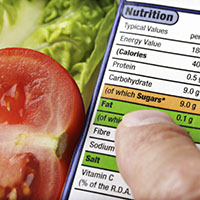Promoting the positive effects of nutrition on health
Eating nutritious food is a key factor in healthy living, and in order to make informed choices, consumers need information on what they buy. Until now, the focus here has very much been on warning consumers about the negative impact of, say, too much fat, sugar and salt in their diet, while less emphasis has been placed on promoting the functional properties of various nutrients. Food companies have therefore found it difficult to assert positive health claims for their products. The BIOCLAIMS project aims to address this by identifying new positive biomarkers – indicators of beneficial biological conditions, such as lower blood pressure – that could be used to measure the effects of nutrition on health. These could help food businesses make new positive health claims and market their products accordingly, and also provide consumers with clear and understandable nutritional information. The project therefore promises to have important societal and economic implications. Interest in health-promoting functional food continues to grow, while consumers are better informed than ever about nutrition. At the same time, the burden of disease associated with poor nutrition continues to weigh heavily on European healthcare systems. Poor diet, overweight and obesity contribute to a large proportion of non-communicable diseases, including cardiovascular diseases and cancer, the two main killers in the region. The starting point of this project was to look at biomarkers from a different point of view. Most accepted biomarkers usually measure negative developments such as disease or tissue damage, as oppose to improved health. What BIOCLAIMS is doing is developing new ‘health biomarkers’ by quantifying the biological mechanisms necessary for maintaining a stable healthy condition (known as homeostasis). These mechanisms are being investigated through a series of food interventions in animal models and humans. Gender differences are also being taken into account. The end result will be a series of measurements that will have been fully evaluated for practical application in human nutrition. The project also opens the door to the possibility of personalised nutrition. Nutrigenomics – the basis of the BIOCLIAMS project – combines the study of nutrition and genetics, and could revolutionise our understanding of nutrition-health relationships. This could allow for nutritional advice to be tailored to individual needs. Personalised nutritional advice could influence dietary behaviour more efficiently than the standard, ‘one size fits all’ approach, and transform our relationship with the food we eat. Trials are currently well underway. Supplements containing phytochemicals (compounds that occur naturally in plants) such as sulforaphane and quercetin are being tested for their potential to decrease the risk of developing diabetes and heart disease, on the back of new research being carried out at the University of Warwick. Researchers found that vegetable-derived sulforaphane and quercetin are capable of stimulating a protein that controls the cellular expression of a host of protective genes in the body. The BIOCLAIMS project involves scientists from 11 institutions from seven European countries. Started in 2010, it is scheduled to run until 2015. For further informatio, please visit: BIOCLAIMS http://bioclaims.uib.eu/
Countries
Spain



